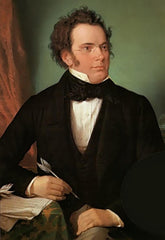Learn About the Austrian Composer, Franz Schubert's Works and Life
Franz Schubert: Overview
- Born: 1797 - Vienna
- Died: 1828 - Vienna
- Historical Period: Early Romantic
- Musical Media: orchestra, chamber music, keyboard, opera, songs, choral

Franz Peter Schubert was born in the year 1797 in Austria from the modest family of a schoolteacher. Despite never gaining the riches that someone of his caliber would be expected to, Franz enjoyed immense fame due to his short but extremely prolific musical career. He was considered to be the perfect amalgamation of classicism and romanticism in musical spheres. Schubert kept on producing a large volume of work until his death from syphilis in 1828.
Franz Schubert: Austrian Musical Savant
As one of the surviving sons of Theodor Schubert, the young Franz was instructed in music by his father and uncle. He was enrolled at the Stadtkonvikt, to train himself to perform at the chapel of the Imperial Court. This led him to get a scholarship in the year 1808, which made him a part of the court’s choir. Among his instructors were Wenzel Ruzicka and Antonio Salieri, who was a very respected composer. The latter considered Franz Schubert to be a musical prodigy.
The years between 1813 and 1815 were remarkable for the composer as he started showing signs of a very original and classy musical prowess. To behold his early creative capabilities, we need only look at his first operatic work, Des Teufels Lustschloss, which he wrote in college. Apart from this, he also wrote five string quartets, three symphonies, and three masses. The year 1814 saw the young composer gradually realizing his talents through a number of symphonies, and his first couple of leads were Gretchen am Spinnrade and Erlkönig. He is, in fact, considered by many to be the creator of the German Lied.
In 1815, Schubert wrote Die Freunde von Salamanka, Der vierjährige Posten, Claudine von Villa Bella and Fernando. In 1817, he tried his hand at piano sonatas, which produced exquisite pieces such as Der Tod und das Mädchen, An die Musik, and Die Forelle. He became a full-time composer in 1818, and his first work performance was his Italian Overture in C Major in the same year. During the summer of the same year, Schubert came up with a number of other works including, Variations on a French Song in E minor and Sonata in B Flat Major. Some of Schubert’s most well-known pieces, the Piano Sonata in A Major, D. 664, and the Trout Quintet for strings and piano, were composed in 1819. By the end of 1819, he had also worked on the music for poems written by his close friend Mayrhofer, and those by Goethe inspired for Prometheus.
He also composed an operetta, Die Zwillingsbrüder, which opened to a successful performance in 1820. That same year, the composer also wrote music for the play Die Zauberharfe. The Wanderer Fantasy, Eighth Symphony in two movements, Die Schöne Müllerin, Die Verschworenen, and Fierrabras, an opera, followed in the next few years. As a master of his ‘trade’, Schubert kept on composing with chamber works like Octet in F Major and String Quartet in A Minor, along with piano duets such as Divertissement à la Hongroise and Piano Sonata in C Major.
Ave Maria, also known as Ellens dritter Gesang or Ellen’s Third Song or Ellens Gesang III (D. 839, Op. 52, No. 6), was written in 1825 by Franz Schubert among his Opus 52, which was Walter Scott’s epic poem, The Lady of the Lake, conveyed into seven German songs. He was also responsible for the String Quartet in G Major and the Piano Sonata in G Major in the year 1826. The following year, records show that he wrote a Piano Sonata in C Minor and a dozen songs of Winterreise. Additionally, Impromptus and Six Moments Musicaux, which are piano solos, were also produced.
Franz Schubert’s greatest piano piece was Fantasy in F Minor (1828), followed by the Great Symphony, and the Mirjam's Siegesgesang, a cantata. His String Quintet in C Major is seen as his final classical period work. His immense plethora of works made him a master at what he did, where he was particularly noted for his lyrical magnificence. Although a close student of Beethoven’s works, Schubert wasn’t the one who was entirely influenced by him. We can actually catch glimpses of Haydn and Mozart’s brilliance in Franz Schubert’s work, and he was so skilled that he could churn out several extraordinary pieces a day.
The fact that he eventually ended up writing over 600 musical pieces with magnificent lyrics, goes further in showing us his genius. As for the tone or style of his songs, they ranged from happiness to extreme melancholy, nevertheless, every composition was distinct, with the piano complementing the song perfectly. An additional feature of his music was that he juxtaposed diverse chords while modulating into a remote key without much trouble. Franz Schubert passed away before he was 32, but even then, he was able to write at a marvelous pace that not only then, but still, attracts generations of music enthusiasts.
Reference Links:
- Franz Schubert on Biography
- Franz Schubert on Britannica
- Franz Schubert on M Files
- Franz Schubert on Classical Net
- Ave Maria by Schubert on Wikipedia
- Essential Dictionary of Composers by Alfred Publishing
Related piano sheet music:
- Ave Maria by Schubert: Multi-levels
- Ave Maria by Gounod & Bach: Multi-levels
- Classical music: Piano sheet music at multi-levels
- Classical Piano and Keyboard music: Piano sheet music at multi-levels
- Music from operas: Piano solo sheet music at multi-levels
- Music from orchestral pieces: Piano solo sheet music at multi-levels
- Music for Wedding: Piano sheet music at multi-levels
- Winter holiday and Christmas: Piano sheet music at multi-levels
